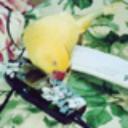Yahoo Answers is shutting down on May 4th, 2021 (Eastern Time) and beginning April 20th, 2021 (Eastern Time) the Yahoo Answers website will be in read-only mode. There will be no changes to other Yahoo properties or services, or your Yahoo account. You can find more information about the Yahoo Answers shutdown and how to download your data on this help page.
Trending News
Bird eats but still losing weight?
My 3 yr old Gouldian eats constantly. Her poops are not the normal green, the seed is still whole. Any ideas on what's ailing her?
13 Answers
- Christie DLv 51 decade agoFavorite Answer
As others have said, she is really sick and needs to see an avian vet asap.
Gouldians shell/hull their seeds and DO NOT need grit in their diet.
From Lady Gouldian Finch:
Going Light, The Lights, Fading Away or Wasting Away disease,
what ever you call it, this problem has been known
to aviculture since the hobby began.
Birds will eat and eat and still get thin, thin and thinner. Most times you will find the bird dead in the feeder cup. The more they eat, the thinner they become. I use the term “disease” in describing this problem. What causes a bird to "go light?" The answer to this question is complicated by the fact that “going light” is not a single disease but really only a symptom common to a large number of diseases. In this Quick Reference Guide I am making the assumption that the birds are dealing with a parasite/disease, not a poor nutrition, beak or mouth injuries, bully birds in the aviary, viral diseases or chronic kidney, liver or respiratory disease just to name a few, causing them to " waste away."
More common in baby birds
This condition can be seen in adult birds however, I see it more in chicks. The chick's immune system is not fully developed making it impossible for it to deal with parasites. This baby Gouldian in the photo above is an extreme case of wasting away. You can visually see the razor sharp breast (keel) bone protruding from his body.
No visual signs of wasting away
In the Sick Bird article you will find a complete list of signs and behavior that will help you identify if your bird is ill. Finches are so well adept at hiding illness, I believe it is necessary for you to catch your bird on a regular basis for a physical exam because a disease may be quite well advanced by the time he shows any signs of the illness. The weight loss may be extreme making it impossible to reverse the condition and the bird will die.
Holding the bird in your hand
If a bird in "going light," the fat layer immediately under the skin and abdominal fat are the first to be used followed by the large pectoral muscles, which lie on either side of the breast bone. Holding the bird in your hand, feel around his breast (keel) bone area. Normally the breast If the keel bone is sharp and can be felt, coupled with a sunken abdomen, this is the main characteristic of a bird "going light."
There are several possible causes for this condition.
Bacteria infection is the most common. Bacterial diseases are usually food or water related. There are several types of bacteria that can cause the wasting symptoms. Bacterial diseases such as salmonella, E.coli and other forms of enteritis (inflammation of the gut) may require antibiotics. Amoxitex is the antibiotic that I use to treat bacterial infections. It is particularly useful in treating conditions such as sinus infections, enteritis, skin and follicle infections, wounds, pneumonias, and reproductive infections. Water hygiene is very important with bacterial diseases. Sparkle is a specially formulated water cleanser to prevent the multiplication of bacteria in your water containers. Sparkle can be used before and during the breeding season on a continual basis without ill effect to the babies or parents.
Protozoa infections are the second most common cause. Cochlosomosis is the most serious protozoal infection of the Gouldian finch. It is especially a problem in young birds from the age of six weeks until the end of molting. If an protozoa outbreak occurs, Ronex is the treatment that I recommend.
Immediate treatment required
Speed is essential if the bird is to survive and recover. Often you don't have time to take your bird to the vet and have a culture to find out exactly what is wrong with your bird. In this case we suggest you mix the Ronex and Amoxitex together in the birds drinking water and treat for bacterial and protozoa infections at the same time.
Coccidiosis is normally confined to ornamental aviaries and is associated with wet weather and dirty floors. Birds are at risk of becoming infected with coccidial protozoa particularly during wet weather for more than three days. Cocci-Care is an anticoccidial treatment for birds that I have found to be very effective in the prevention of Coccidiosis.
Parasites intestinal freeloaders such as gizzard, tape and round worms can cause diarrhea containing undigested seed. The signs of worms are usually non-specific-often a bloody diarrhea followed quickly by death. Worm infestation causes the bird to loose weight because it blocks the intestine, making it difficult for the bird to absorb food. Food is also not digested properly and is found intact in the bird's feces. Treatment Worm Away in their water will kill intestinal worms, including tapeworm.
External Mites Red mites are very tiny insects that live in the cracks and crevices of cages and aviaries. They only come out at night to infest the bird and suck its blood. This will cause the bird to "go light" through loss of energy. Pestex is safe enough to spray on newly hatched chicks but deadly to insects including mites and lice.
Air Sac Mites is the most common ectoparisite seen mostly in the gouldians, canaries and finches. The life cycle is complicated and the chicks can become infected by the parents regurgitating food and mites. The signs of air sac mites include open mouth breathing, a clicking respiration, coughing, sneezing and head shaking. The air sac mites invade the sinuses, windpipe, lung tissue and the major air sacs throughout the birds body. The increased energy required to breathe plus decreased eating due to shortness of breath, will cause the bird to go light. Scatt and S76 are extremely effective in killing the adult mite and the eggs that hatch after the application due to it's three week residual action.
Supportive treatment
Warmth is vitally important at this time. Isolate the bird in a hospital cage or an open cage with a heat source (ceramic heat lamp, heating pad). Provide NV Powder or Thrive in the drinking water and make the food easily accessible. Crop or tube feed if the bird can't eat on it's own.
Prevention is most important
Source(s): http://www.ladygouldianfinch.com/ - Anonymous5 years ago
So, you are a vegetarian, and that makes it difficult to get your protein source, which you are severely lacking. If you want to lose weight, you need to have a protein source like soy, nuts, or beans in your diet. Stay away from the white rice and replace it with long grain wild rice or brown rice. You are taking it too much carbs with eating toast for breakfast. Stay away from the pastas / breads and consider eating more fruits as a natural carb source. Please consume some sort of protein source for breakfast. It will give you sustained energy. Also, eat 5-6 small meals during the day instead of 3 meals. Those 5-6 small meals will sustain your energy and boost your metabolism. Also, doing 15 minutes of cardio is not going to be enough unless you are incorporating light hand held weights into that routine. Resistance training helps build lean muscle and burn fat. You need to change your routine every week in order to see any changes in your body. If you keep doing the same thing every week, your body will get used to that routine, and you'll reach a plateau, which means your body will stop changing.
- 1 decade ago
She needs help breaking the seed down. Try some shell grit it helps grind the seeds to digest.
This is something a vet needs to answer. Sounds gross but the poo is a great way to tell what is going on with your animal. Take some to the vet with you. Though birds usually poo every 30-40 mins. You'll prolly get a fresh one waiting there.
- 4 years ago
The next time it snows, up your karma and also shovel your neighbor's sidewalk too.
- How do you think about the answers? You can sign in to vote the answer.
- Mellycat123Lv 41 decade ago
Sounds like she is having some digestive issues. This needs to be checked by an Avian Vet ASAP! It could be anything from a bacterial or fungal infection to something more serious! Get her to the vet!
- PJJLv 51 decade ago
This is definitely a problem your vet needs to address. Things like coccidiosis and diabetes can cause these symptons. Both of which would have to be diagnosed and treated by a vet.
Source(s): see profile - 4 years ago
Preset the timer on your own TV to turn off after one hour to remind you to take a step more active.
- 5 years ago
Instead of sitting and studying, listen to books on tape as you walk, clean, or garden.









